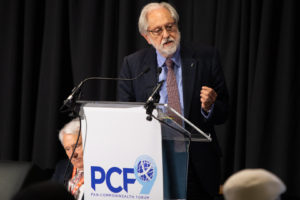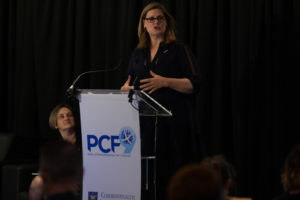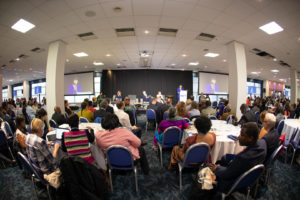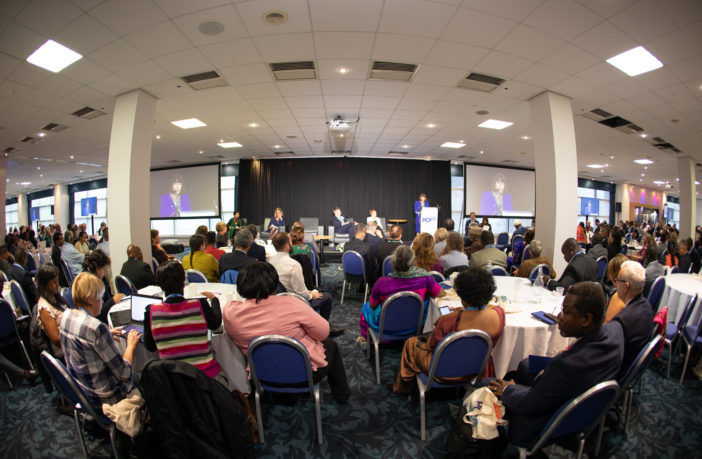As the ninth Pan-Commonwealth Forum closed, there was a renewed sense of urgency about the global education crisis. The next 10 years is critical in order to meet the UN’s sustainable goal 4 – education for all. PCF9 provided the platform on which partnerships have been forged, commitments made and a reinforced understanding of the vital roles everyone must play.
The conference heard from several of the leading authorities in open distance education including Lord David Puttnam, the Commonwealth of Learning, Sarah Brown, speakers from Open Universities all over the world – UK, India, Nigeria, Indonesia, Bangladesh, Indira Gandhi National, Botswana, Sri Lanka, Helsinki and Mauritius – and a host of practitioners from around the global. The challenges of equity and inclusion of girls and young children in education, technology and lifelong learning were debated and solutions mooted.

Lord Puttnam stresses the importance of lifelong learning
PCF9 in numbers
There were several big numbers mentioned throughout PCF9, from the collect reach of the delegates attending to the sheer scale of children who are missing out on educational opportunities around the world. But possibly the most startling figure was presented during Sarah Brown’s speech. She told PCF9 that on average a refugee is a refugee for 17 years. For a child born to a family who have been displaced, 17 years could be their entire childhood which highlighted to importance of providing educational opportunities alongside humanitarian aid.

Sarah Brown calls on ministers and delegates to think differently about global education
- 61 Nations represented at the conference
- 520 delegates attended
- 260 million young people missing out on education globally
- 71 million people forcibly displaced around the world
- 63% of child refugees receive a basic primary education
- 17 years is the average time a refuges is a refugee
- 50 per cent of the current workforce expected to be automated by 2030
- Up to 375 million displaced workers likely to require new skills by 2030
- Six out of 10 adults lacking in basic ICT skills required for emerging jobs
The importance of The Open University
In her closing remarks, The Open University’s Vice-Chancellor Professor Mary Kellett said:
“The secret of change is to focus all of your energy, not on fighting the old, but on building the new. Never doubt that a small group of thoughtful, committed citizens can change the world. Indeed, it is the only thing that ever has.
“All our conversations should now be superseded by a path that leads us to making Open Distance Learning the new norm – the future of education is ours to claim. And we can only change hearts and minds; and lives, if we do it together.”

Professor Mary Kellett, Vice-Chancellor of The Open University, addresses PCF9
As The Open University celebrates 50 years of providing open distance learning, it can reflect on how far its methods of delivery evolved. From sending course material and study kits via the post to today harnessing mobile learning, bringing learning opportunities to the students wherever they are in the world. Everything the OU does is designed to be as flexible as possible, to fit into students’ lives. It is this ethos that will not only help students in the UK but also in some of the most disadvantaged regions of the world.
A committed advocate of lifelong learning
Professor Kellett reinforced the commitment of The Open University to:
- Actively advocate the role of lifelong, quality, open distance education in addressing the education challenges faced.
- Sharing practice in research and teaching, as well as exchanges in expertise in learning analytics, OER, curriculum and courses.
- Moderate our language from referring to ’24,000 disabled students’ to ‘differently able ’
- Actively build out, in partnership, our teacher education programmes TESSA and TESS- India that have supported millions of teachers and educators across India and Sub-Saharan
As the bagpipes played and the sun set on PCF9 there will be an inevitable reflection on the enormity of what lies ahead and responsibility of all those who attended. The Edinburgh statement will serve as a reminder until PCF10 in 2022.



